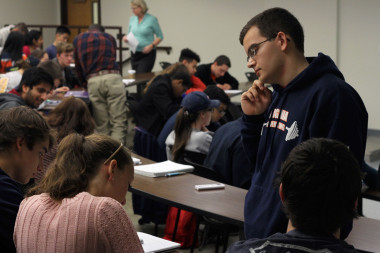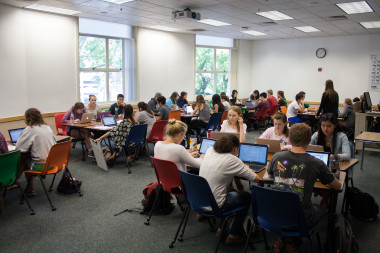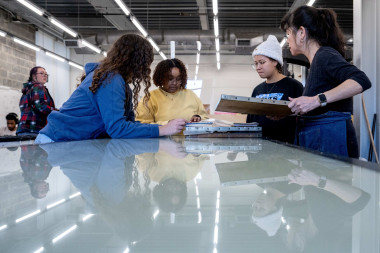Collections
Expertly curated content on a wide range of pedagogically focused topics

Reflective Teaching Statements
A reflective teaching statement is a short narrative that describes your beliefs, goals, and practices regarding teaching and learning in your field. This collection offers guidelines for writing teaching statements, examples from several disciplines, and a rubric to assess your teaching statement.

How Can You Integrate Inclusive Course Design Principles Into Your Canvas Course?
If you're interested in how you can leverage principles of transparency, sense of belonging, and accessibility to enhance your course in Canvas, check out the resources in this collection! We provide definitions for these concepts and include suggestions for small, incremental changes as well as larger, structural changes.

Getting Started with Team Teaching
Teaching with others can enrich student learning and instructor joy, but the challenge of aligning vision and methods may surprise new co-teachers. Use the resources here to support smoother collaborative teaching. Note: we use 'co-teaching' to mean shared teaching responsibilities.

Digital Media Projects in Chemistry: An Annotated Assignment
This collection explores a digital media project in a general chemistry course. Included are the assignment description, a sample student project, and resources to support students' work and instructor assessment efforts. Be sure to read the annotations on the linked files.

Measuring the Impact of UVA's CDI
This is a collection of UVA Center for Teaching Excellence's peer-reviewed research demonstrating the efficacy and impact of its multi-day, intensive course design institute.

Teaching Effectiveness Frameworks
This collection highlights a range of teaching effectiveness frameworks developed for higher education contexts, primarily research-intensive institutions. These frameworks provide analytical approaches to understand the elements of teaching.

Getting Started as a Graduate Teaching Assistant
This collection provides introductory resources for new graduate teaching assistants in a variety of roles, including facilitating discussion or lab sections, holding office hours and review sessions, giving feedback to students, and grading student work.

How Can Instructors Support Students’ Self-efficacy?
Instructors play a critical role in helping students see themselves as capable within disciplinary domains, especially when they don’t see themselves as "a [insert your discipline person]." The resources here start simple and increase in complexity (and comprehensiveness).

Practical Approaches to Support Student Belonging in the Classroom
Research shows that students who feel they belong in a course or discipline are more likely to persist and can promote learning. This collection provides a set of practical resources for fostering a sense of belonging in your classroom.

Essentials for Collaborative Learning Groups
Whether you're organizing informal in-class groups or assigning out-of-class group projects, it takes care to make group work run well. This collection features our favorite resources for supporting students through sustained collaboration in persistent or ephemeral learning groups.

Self-Study for Teaching Documentation
How do you successfully document your teaching? In this collection, you will explore self-study approaches that provide you with an authentic representation of your teaching based on evidence of what you do in your teaching.

Reflective Writing in SoTL
Reflection is valued in teaching practice, so it should come as no surprise that reflective writing is valued in the scholarship of teaching and learning (SoTL). Learn more about reflective writing in SoTL and peruse a few of my favorite examples from a range of approaches and perspectives.

Grading for Growth
Are you interested in alternative grading but don't know where to begin? Our collection takes you through the key ideas, with links to concrete ways to get started.

Diffusing Hot Moments in the Classroom
"Hot moments," or moments of conflict, may arise in our classrooms. If we're prepared for these challenging moments and consider all parties with a trauma-informed lens, we can use these moments to enhance, rather than derail our students' learning.

An Introduction to Indigenous Pedagogies
This collection is a step to exploring Indigenous pedagogies and ways of knowing. I have used most of the listed readings in a faculty and grad student special interest group on the topic. Some of the resources address teaching and learning more directly than others but together they provide a good first foray into the topic.

Collaborative Grading
These resources explore the practice of collaborative grading, an alternative grading approach in which students and instructors determine grades for a given course in consultation with one another.

Universal Design for Learning (UDL) and the Syllabus
The syllabus is a reflection of one's course design and a powerful tool for defining the context of learning in your course. These Universal Design for Learning (UDL) resources help you create a more accessible and inclusive syllabus that reduces learning barriers and welcomes learner variability.

From Class to Community: Centering Trust in Learning Spaces
A collaborative classroom doesn’t happen by accident; it's created by design. Use these tools to lower resistance, foster trust, and help students learn with one another rather than just from you.

Making the Most of Office Hours
Office hours can be a useful opportunity for students to get the assistance and advice they need to succeed in a course, but students don't always realize that. In this collection, you'll find resources and strategies for framing and structuring office hours to help students make the most of them.

Supporting Executive Functioning through Universal Design for Learning (UDL)
Executive functions are those mental processes that support attention, organization, time management, and related tasks that are critical to learning. The resources here will help you apply universal design for learning (UDL) to better support students' executive functions.

















